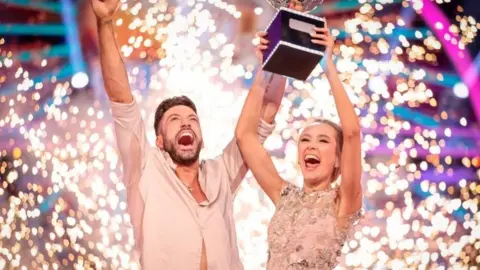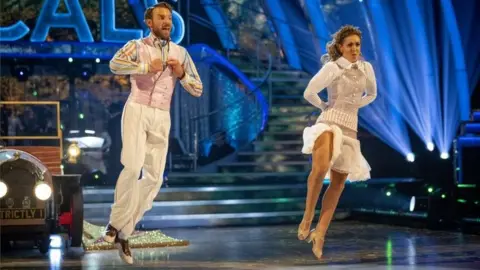Strictly Come Dancing's Amy Dowden: 'I was seen as a risk'
 BBC
BBCFor the past six years, professional dancer Amy Dowden has wowed on Strictly Come Dancing. But before her rise to fame, choreographers and potential dance partners considered her a "risk" to work with for fear her Crohn's disease would impact their careers if she needed to take time out.
"Everyone is used to seeing me on Strictly with all the hair and make-up and the biggest of smiles," she says, but behind the scenes she manages a chronic illness.
Crohn's disease is a lifelong invisible condition which causes parts of the digestive system to become inflamed. For Amy, this can cause swollen eyes, terrible mouth ulcers, constipation, severe pain, sickness and fatigue. She takes eight steroids a day to stay out of hospital.
"It's certainly a rotten illness to live with," she tells the BBC Access All podcast.
Amy was diagnosed aged 11, just as she started to rocket through the junior dance ranks. She hated people asking about her health rather than her dance aspirations, but far worse was the reaction from dancers when she was looking for new partners.
"I'd go for a try-out and then as soon as my dance teacher would say 'you need to tell them about your Crohn's,' I wouldn't hear back from them," she says.
"I had so many rejections because of my Crohn's. If a producer wants to take you on tour, [they question] what happens to them and their insurance when I'm poorly? You're seen as a risk."
It's why she takes every opportunity to speak openly about it now.
Her Bafta-winning documentary Strictly Amy: Crohn's and Me didn't hide the realities of the illness showing her in hospital in agony, her voice rasping.
"People don't want to talk about poo and guts and bowels. They all get embarrassed. So it's about breaking down the stigma," she says.
But it has taken her a long time to reach that confidence.

LISTEN: You can hear more from Amy on the BBC Access All podcast.
And after the government unveiled its plan to reform support for children with special educational needs and disabilities (SEND) in England, parents Tania Tirraoro and Lucy Bartley, see how it shapes up.


Amy did eventually find a dance partner - Ben Jones who she is now married to - but getting past the discrimination within the industry has been difficult.
It's why, when she was selected for Strictly Come Dancing she had decided not to mention her chronic illness.
Although Amy and Ben had become British National Latin Dance Champions that same year, she worried her medical history would eclipse that and the show would drop her.
The live Saturday night show partners professional dancers with a celebrity who has little or no dancing experience, all hoping not to get knocked-out, and to win the final.
"I didn't want a celebrity to go, 'I don't want Amy because she's got Crohn's'. I wanted to prove myself on the show first."
Looking back, she says this was "ridiculous" and her parents convinced her to meet the production team to tell them.
"I can remember sitting in that meeting and saying 'I've got Crohn's'. And they were like 'that's absolutely fine, let us know what we need to do'."
It was the first time she had experienced such positivity.
"The team always ensure that I'm not pushing myself. Sometimes they make me take the afternoon off to rest. They do it for everybody. There's always a contingency plan if people are injured."
Amy has been part of those Strictly seasons which have brought disabled contestants to the fore, often challenging audience perceptions.

Rose Ayling-Ellis won legions of fans and the competition, lifting the glitterball trophy in 2021, when she demonstrated being deaf was no barrier to enjoying music and dance. Ellie Simmonds became the first person with dwarfism to compete alongside her partner Nikita Kuzmin who himself has Type 1 diabetes.
Recently, Amy has partnered CBeebies favourite, George Webster, who has Down's syndrome, as well as TV presenter and Royal Marine veteran, JJ Chalmers, who has a limb difference after he was injured by a bomb in Afghanistan.
Amy says it often leads to a closer understanding between her and her partner as they know what the other is going through.
"I understood pain," she says of being paired with JJ. "It was the perfect partnership. We have our own pain battles to deal with and we could both sit there and just chat about hospital stays."
When working on the choreography there were some adaptations to be made. She knew JJ couldn't complete lifts and arm movement above the shoulder was restricted.
"I would technically explain a movement and then realise ' Oh, it doesn't work, because he's missing that muscle'. And it was my job to learn how to then teach him to get the movement.
"I just adapted and I absolutely love the challenge."
Adaptive dancing is one of Amy's great passions. To fund her dancing career she set-up the Art in Motion dance studio with her husband which specialises in teaching disabled children.
But she says adaptations are just part of dancing.
"I have to adapt myself for every single celebrity. Teaching [comedian] Brian Conley was totally different to teaching [musician] Tom Fletcher. Everybody learns differently, everyone moves differently. So it's just working out what works for you and collaborating."

JJ and Amy did well and reached the quarter-finals. Although they didn't win the competition, the journey held real meaning.
"I'll never forget when JJ said: 'This is better than any rehab'. That will stay with me forever," Amy says.
Crohn's is no longer a barrier to her career and she is no longer considered a "risk", but she continues to speak out to help others.
Amy and the rest of the Strictly professionals are currently on tenterhooks waiting to hear if they'll be part of the Class of 2023.
"Hopefully I'll be going into my seventh year," Amy says. "I'm just taking every year as it comes and being grateful. In years to come, Ben and I would love to start a family, but at the moment I want to make the most of dancing."
You can listen to the podcast and find information and support on the Access All page

